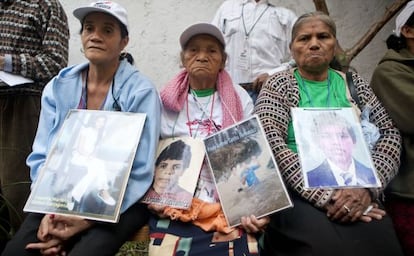Searching mothers ask Mexico to help find their children
Central American women cross country in search of offspring who disappeared en route to US


Since 2010, Blanca Gómez has owed a friend back home in El Salvador $4,900.
Her neighbor’s children have all made it to the United States where they are working and sending dollars back to their families. They have become the envy of many of their friends in their village of Oratorio de Concepción, El Salvador, who also dream of migrating.
It was Blanca’s son, Luis Roberto, 21, who took out the loan thinking he would pay it back quickly once he got to the United States. After reaching Mexico, he contacted a guide and two smugglers (popularly known as coyotes) to help him cross the border, but soon afterwards he disappeared. It was as if the earth had swallowed him up.
As Blanca, 53, continues to pay off the loan, she searches for her son.
From El Salvador, Guatemala, Honduras and Nicaragua, they come to Mexico with large photos hanging from their necks looking to find out what happened to their children. They are part of the so-called Central American Mothers Caravan that began a journey on December 2 in Tabasco – on the border with Guatemala – and crossed nine other Mexican states before reaching Mexico City on Monday.
This is the ninth year that the searching mothers have organized this trip.
“The last time we spoke she was in Nuevo Laredo [on the Mexican border with the United States], and she told me that in a few days she was going to cross with a coyote,” recalled Priscilla Cartagena, who came from Honduras to find answers about her missing 19-year-old daughter. Yesenia disappeared in 2008 when she “set out in search of the American dream,” explained her mother.
During the next week, the mothers will travel north to meet up with other migrants. They are demanding the Mexican government help search for their children, whether they are “dead or alive,” and bring to justice the criminal gangs responsible for their disappearance.
Organizers of the caravan said they have documented about 70,000 missing persons’ cases that have taken place over the past 30 years.
Crime groups in Mexico, which traditionally focus on drug trafficking, have found other ways of making money: they kidnap Central American migrants who are trying to cross into the United States and demand ransoms from their families. Many are forcibly recruited to ferry drugs across the border and if they refuse, they are killed and their bodies buried in common graves. The notorious Los Zetas criminal gang has been involved in most of these violent kidnapping incidents, authorities said.
At a news conference in Mexico City, the mothers reaffirmed their commitment to continue their search. As an example of their determination, they pointed to 26-year-old Eugenio Marcelino, who is one of four people who were reunited with their mothers on this journey.
Some of the women on this trip are in their eighties, and the encounter with Eugenio Marcelino has given them hope.
“He lied to me, he said that he was going to Guatemala but I didn’t believe him,” said Narcisa del Socorro Gómez, Eugenio’s mother who is from Nicaragua. “He never called me.”
Eugenio explained that he never called because there are no phones in his village and he lost the few numbers he had. “I never tried to cross the border [into the United States]. I grew accustomed to the life I have.”
While he said that he is happy to be reunited with his mother and will go back to his village in Nicaragua, Eugenio explained that he wants to return to Tijuana to set up an auto repair shop. “I use to think about returning but now I don’t know. What I do know is that there is nothing like a mother’s love.”
Tu suscripción se está usando en otro dispositivo
¿Quieres añadir otro usuario a tu suscripción?
Si continúas leyendo en este dispositivo, no se podrá leer en el otro.
FlechaTu suscripción se está usando en otro dispositivo y solo puedes acceder a EL PAÍS desde un dispositivo a la vez.
Si quieres compartir tu cuenta, cambia tu suscripción a la modalidad Premium, así podrás añadir otro usuario. Cada uno accederá con su propia cuenta de email, lo que os permitirá personalizar vuestra experiencia en EL PAÍS.
¿Tienes una suscripción de empresa? Accede aquí para contratar más cuentas.
En el caso de no saber quién está usando tu cuenta, te recomendamos cambiar tu contraseña aquí.
Si decides continuar compartiendo tu cuenta, este mensaje se mostrará en tu dispositivo y en el de la otra persona que está usando tu cuenta de forma indefinida, afectando a tu experiencia de lectura. Puedes consultar aquí los términos y condiciones de la suscripción digital.








































